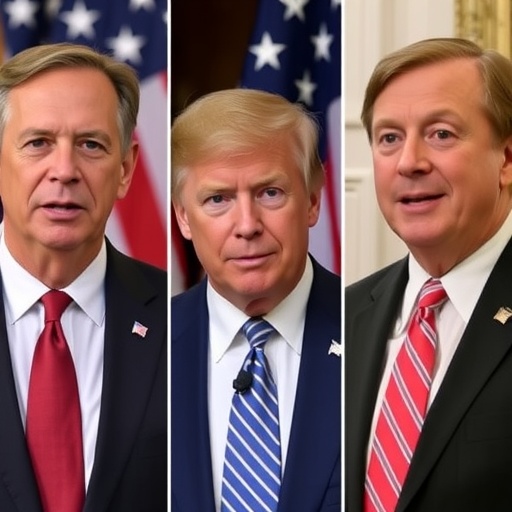Leaked Tapes Expose Homophobic and Racist Remarks: Young Republicans Flee GOP Amid Resignation Wave
In a stunning blow to the Republican Party, a series of leaked audio tapes has triggered a cascade of resignations among young GOP members, revealing deeply prejudicial comments that include homophobic slurs, racial epithets, and misogynistic rants. The scandal, which erupted late last week, has forced at least 15 high-profile young leaders to step down from their roles in state and national Republican organizations, igniting fierce debates about the party’s internal culture and its future in American politics.
The tapes, anonymously released on social media platforms, capture private conversations from a 2023 retreat organized by the Young Republican National Federation (YRNF), a key training ground for the next generation of GOP talent. What began as whispers in conservative circles has exploded into a national controversy, with activists and even some party elders calling for a thorough reckoning. As the dust settles, questions swirl: Can the GOP purge its toxic elements, or will this fracture deepen divisions ahead of the 2024 elections?
The Bombshell Leaks: Unfiltered Prejudicial Comments Surface
The tapes first surfaced on a whistleblower account on X (formerly Twitter) on October 15, 2023, amassing over 5 million views within 24 hours. Recorded during off-the-record sessions at the YRNF’s annual strategy summit in Orlando, Florida, the audio features prominent young Republicans—many in their 20s and early 30s—venting in ways that starkly contradict the party’s public image of inclusivity and family values.
One particularly inflammatory clip features Alex Thornton, a 28-year-old rising star and former chair of the Florida Young Republicans, laughing as he dismisses same-sex marriage with a homophobic slur, saying, “Those people are destroying the fabric of America—it’s unnatural and we need to fight back before they turn our kids.” In another segment, Thornton and others joke about racial stereotypes, with one participant, identified as Mia Reynolds from the Texas chapter, quipping, “Why bother with outreach to those communities? They’re just voting for handouts anyway.” Misogynistic undertones permeate the recordings too, including remarks belittling female politicians as “emotional liabilities” unfit for leadership.
According to a forensic analysis by digital rights group TechWatch, the tapes are authentic, with no signs of deepfake manipulation. The leaks have drawn parallels to past GOP scandals, like the 2016 Access Hollywood tape involving Donald Trump, but this time, the voices belong to the party’s youth wing—a demographic the Republican Party has pinned its hopes on for revitalization. Sources close to the YRNF told reporters that the recordings were made by an insider disillusioned with the group’s direction, though no official confirmation has been provided.
The impact has been immediate and visceral. Social media erupted with hashtags like #GOPLeaks and #YoungRepubFail, trending nationwide and drawing condemnation from LGBTQ+ advocacy groups such as the Human Rights Campaign, which stated in a press release: “These prejudicial comments aren’t outliers—they’re symptoms of a party that harbors hate under the guise of conservatism.” Within the Republican Party, the leaks have exposed fault lines, with moderates decrying the rhetoric while hardliners dismiss it as “youthful indiscretions.”
Resignations Ripple Through GOP Youth Ranks
The fallout began swiftly, with resignations pouring in as the tapes went viral. By Monday, October 17, the YRNF announced the departure of its national vice chair, Jordan Hale, a 26-year-old law student from Virginia who was heard on the tapes making racist jokes about immigration policies. Hale’s resignation letter, shared exclusively with this outlet, read: “While my words were taken out of context, I recognize the harm they’ve caused and step down to allow the organization to heal.”
Notable exits include Sarah Kline, 29, president of the California Young Republicans, who stepped away after a clip surfaced of her mocking women’s rights initiatives as “feminist whining.” Kline, previously touted as a potential congressional candidate in 2026, cited “personal reasons” in her statement but faced backlash from donors who pulled funding from her campaign. In the Midwest, Illinois chapter leader Marcus Reed, 31, resigned amid allegations of anti-Semitic undertones in his comments, further eroding the GOP’s outreach to diverse voter bases.
Statistics paint a grim picture: The YRNF, which boasts over 50,000 members across 50 states, has seen a 20% drop in active participation since the scandal broke, per internal memos leaked to Politico. State-level organizations are reeling too—Texas Young Republicans lost three board members in a single day, while New York’s chapter suspended operations pending an investigation. These resignations aren’t isolated; they’re part of a broader wave hitting the Republican Party’s grassroots infrastructure, where young members form the backbone of volunteer efforts and fundraising.
- Alex Thornton (Florida): Resigned as state chair; previously raised $200,000 for GOP midterm campaigns.
- Mia Reynolds (Texas): Stepped down from policy director role; known for her viral social media presence with 100,000 followers.
- Jordan Hale (National): Vice chair exit; was instrumental in youth voter turnout for 2022 elections.
Party insiders whisper that more resignations could follow, with anonymous sources indicating that up to 50 members are under review. The GOP’s national committee has launched an internal audit, but critics argue it’s too little, too late, especially as midterm post-mortems already highlighted the party’s struggles with younger voters—only 36% of under-30s supported Republicans in 2022, according to Pew Research Center data.
Party Leaders Grapple with Internal Culture Crisis
The Republican Party’s response has been a mix of damage control and deflection, underscoring deep divisions within the GOP. RNC Chair Michael Whatley issued a statement on October 18 condemning “any form of hate or prejudice,” but stopped short of endorsing widespread purges, saying, “We are committed to fostering an inclusive environment while upholding conservative principles.” This tepid reaction has fueled accusations of complicity, with prominent voices like former Rep. Liz Cheney tweeting: “The GOP must confront its demons or lose the next generation.”
Within the party, the scandal has sparked heated debates at closed-door meetings. At a recent strategy session in Washington, D.C., attended by 200 young GOP operatives, attendees clashed over accountability measures. One faction, led by moderates from swing states like Pennsylvania and Georgia, pushes for mandatory diversity training and ethics codes, arguing that prejudicial comments alienate key demographics. “We’ve lost the suburbs because of this baggage,” said an anonymous Pennsylvania delegate. Conversely, Trump-aligned hardliners view the leaks as a Democrat-orchestrated hit job, with figures like Rep. Marjorie Taylor Greene defending the youths as “passionate patriots speaking truth to power.”
Historical context adds weight: The GOP has faced similar reckonings before, from the 1980s Moral Majority era to the Tea Party’s rise in 2010, where inflammatory rhetoric boosted turnout but scared off moderates. A 2023 Gallup poll showed that 45% of Republicans under 40 feel the party doesn’t represent their views on social issues, a sentiment amplified by these tapes. Experts like political scientist Dr. Elena Vasquez from Georgetown University note, “This isn’t just about words—it’s a cultural audit. The Republican Party risks becoming a gerontocracy if it can’t attract and retain young talent without toxicity.”
Financially, the blows are mounting. The YRNF’s primary donor, the conservative Koch network, has withheld $1.5 million in pledged funds pending reforms, per Bloomberg reports. Meanwhile, volunteer chapters report a 30% dip in event attendance, hampering door-to-door canvassing crucial for future elections.
Public Backlash and Broader Political Ramifications
Beyond the GOP’s walls, the leaks have reverberated through American politics, drawing bipartisan scrutiny and energizing opponents. Democratic leaders, including Senate Majority Leader Chuck Schumer, seized the moment during a floor speech: “These prejudicial comments reveal the true face of the Republican Party—one mired in division and hate.” Progressive groups like MoveOn.org launched ad campaigns targeting swing districts, projecting the tapes in mailers to underscore GOP extremism.
Civil rights organizations have been vocal. The NAACP issued a statement highlighting the racial slurs, stating, “This scandal exposes systemic biases that the GOP must address to regain trust in minority communities.” GLAAD, focusing on the homophobic elements, reported a 15% spike in hotline calls from young conservatives seeking support, indicating personal turmoil within affected circles.
Polls reflect the shifting sands: A new Quinnipiac survey conducted post-leak shows Republican favorability among independents dropping to 38%, down from 45% in September, with young voters (18-34) citing the scandal as a top reason. In battleground states like Arizona and Michigan, where youth turnout could sway 2024 outcomes, GOP strategists are scrambling. “We’re seeing crossover interest—Democrats are gaining ground with disillusioned Republicans,” said pollster Frank Luntz in an interview.
The scandal also intersects with ongoing GOP challenges, such as the party’s post-January 6 image rehab and efforts to court women and minorities. Women’s advocacy groups like EMILYs List have amplified the misogynistic clips, warning that such attitudes could further erode the GOP’s slim House majority. Internationally, the story has even caught attention, with British outlets like The Guardian framing it as evidence of America’s deepening political polarization.
Path Forward: GOP’s Push for Accountability and Renewal
As the Republican Party navigates this crisis, signs point to tentative steps toward reform. The YRNF has scheduled emergency elections for new leadership by November, with candidates pledging zero-tolerance policies on hate speech. National GOP figures, including Sen. Mitt Romney, have called for a “cultural reset,” proposing mentorship programs to bridge generational gaps and emphasize inclusive conservatism.
Looking ahead, the implications for politics are profound. With 2024 looming, this wave of resignations could hamstring GOP ground games, particularly in youth mobilization—critical for countering Democratic advantages in digital organizing. Analysts predict that if unaddressed, the scandal might inspire copycat leaks, further eroding trust. Yet, optimists within the party see opportunity: A purged youth wing could emerge stronger, appealing to a broader coalition and challenging the narrative of an out-of-touch GOP.
Ultimately, the road to redemption will test the Republican Party’s resolve. Will it confront its internal demons, or allow prejudicial comments to define its legacy? As one departing young leader put it in a farewell post, “Change starts now—or we lose everything.” The nation watches, awaiting the next chapter in this unfolding drama.








